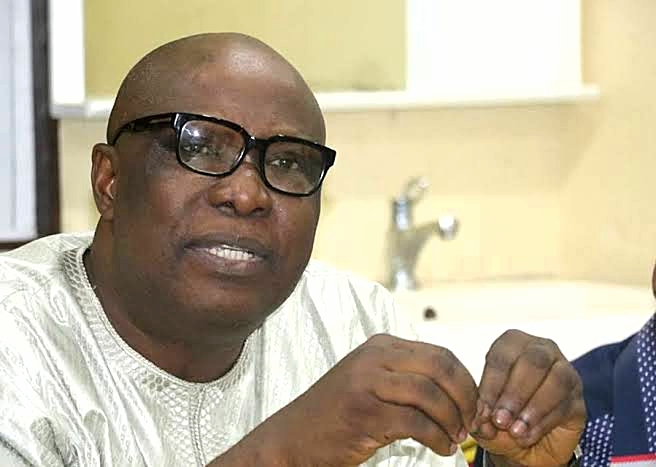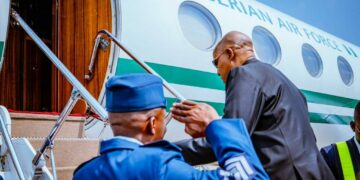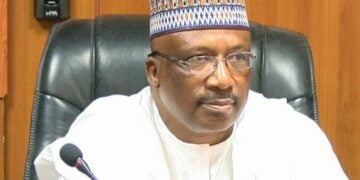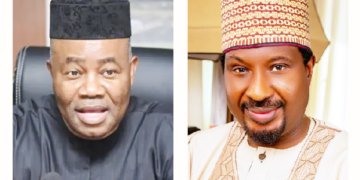Former Special Adviser to late President Muhammadu Buhari on Political Matters, Senator Babafemi Ojudu has cautioned the Lagos State Government over the ongoing remaining of some streets across the state.
Ojudu also called on President Bola Tinubu to wade into what he described as a “troubling trend.”
He noted that some newly elected local government officials have “embarked on a reckless spree of renaming streets—particularly those bearing Igbo names or named after prominent non-indigenes.”
The former Ekiti Central Senator held that, “This is not coincidental; it is a calculated political maneuver rooted in resentment, identity politics, and shortsighted leadership.”
He recalled that the long-simmering tension between Yoruba and Igbo communities reached a boiling point during the 2023 elections.
“Peter Obi of the Labour Party shocked the political establishment by defeating Bola Ahmed Tinubu—Lagos’s long-reigning political figure—in the presidential poll within the state. That upset sent shockwaves through the ruling All Progressives Congress (APC), and fears grew that a similar surprise might unfold in the governorship race. “What followed was an aggressive, divisive campaign that shamelessly weaponised ethnicity, fear, and misinformation,” he maintained.
Ojudu stressed that the development led to wild accusations that the Igbo had “bought up” Lagos, “taken over” the economy, and were scheming to seize political power.
“These narratives were dangerous—and not entirely new. But while they didn’t arise in a vacuum, they have been irresponsibly amplified.
“It’s true that some individuals within the Igbo community, in asserting cultural pride, have crossed into political overreach—not just in Nigeria but abroad.
“A recent example is an Igbo man in Ghana who purchased large tracts of land and declared himself a king, sparking fears—justified or not—of secessionist ambitions in host communities.
“Similarly, the proliferation of self-styled “Eze Ndi Igbo” (Igbo kings) across non-Igbo regions can be perceived as provocative, especially when seen as parallel authority structures. While these acts may stem from pride and cultural identity, they can easily be exploited by opportunistic politicians to sow fear and division.
“But make no mistake: these isolated actions do not justify collective punishment or cultural erasure,” he said.
He acknowledged that Lagos was built by many hands, including Yoruba, Igbo, Hausa, Urhobo, Tapa, and more, adding that, “Its strength lies in its diversity.”
Ojudu asserted that to target any group—especially one so deeply embedded in the city’s economy and social fabric—is not just morally wrong but also politically suicidal.
Rather than stoking ethnic division, the former presidential aide charged political leaders in Lagos to focus on the real threats to the city identified as youth unemployment, drug addiction, urban decay, traffic congestion, and collapsing infrastructure. “These are the issues threatening Lagos’s future—not the names on its street signs.
“What makes this ethnic posturing even more shortsighted is the broader national context. Discontent is rising across Nigeria. The economy is reeling, inflation is crushing households, and insecurity remains rampant.
“As the 2027 elections approach, the ruling APC is grappling with waning public trust. Alienating a significant Southern demographic—the Igbo—while Northern political elites express growing dissatisfaction with Tinubu’s leadership is a dangerous gamble.”
He noted that just recently, a Northern political heavyweight and leader of the New Nigeria Peoples Party (NNPP), Engr. Rabiu Musa Kwankwaso declared that the North feels marginalised under the Tinubu’s presidency and may not support his re-election.
“If the North grows distant and the South-East is antagonised, where will the support come from? This trend risks isolating the South-West politically—and that isolation will not bode well for the Yoruba, both at home and in the diaspora.
“This is where President Bola Ahmed Tinubu must rise above the fray. He cannot afford to allow partisan loyalty or ethnic sentiment to blind him to the growing danger of ethnic polarisation. Left unchecked, it could spiral into something far more sinister—even ethnic cleansing. Nigeria is too fragile for such a descent,” he warned.
The veteran journalist charged the President to initiate a process of reconciliation by reaching out to Igbo leaders at home and abroad to promote moderation and mutual respect.
“Online abuse and reckless insults, such as referring to revered Yoruba figures like Wole Soyinka in derogatory terms, must cease. I was stunned to read a young Igbo man referring to Soyinka as a “gbajue professor.” Such incivility wounds the national psyche and deepens mistrust,” he noted.
At the same time, Ojudu said the president must speak frankly to the Yoruba communities, especially indigenes of Lagos. “Being a host comes with responsibility, not superiority. You cannot sell your land willingly, spend the proceeds on indulgent lifestyles, and then resent those who invested and built on that land. You cannot eat your cake and still have it. If you admire the success of others, emulate their work ethic and community spirit—don’t scapegoat them,” he said.
Meanwhile, he stressed that the fault lines were also cracking elsewhere in the North, with Muslim-Christian tensions rising.
“The once-cohesive Fulani-Hausa alliance is showing strain. In the South, Yoruba-Igbo relations are fraying. In the Niger Delta, some groups are rejecting the inclusion of Igbos in the Biafra narrative. Even among the Yoruba, there is growing resentment against the idea of “giving everything to Lagos,” while some Lagosians disparage non-indigenous Yoruba (“ara oke”) who’ve found success in the city.
“Nigeria is a house divided—and unless urgent steps are taken, it may not stand much longer. The crisis in Rivers State has stirred new waves of resentment in the Niger Delta. Everywhere, identity-based fault lines are deepening.”
He insists that President Tinubu must not be complacent, adding that “If Nigeria fractures, history will not remember his economic policies or political victories. It will remember that the house collapsed under his watch.
“The task before him is urgent and non-transferable: call your boys to order, heal old wounds, unite the nation, and rise above petty politics. This is not a job for committees or proxies. Only bold, visionary leadership can pull Nigeria back from the brink. The window is closing. Now is the time to act,” the APC chieftain added.





